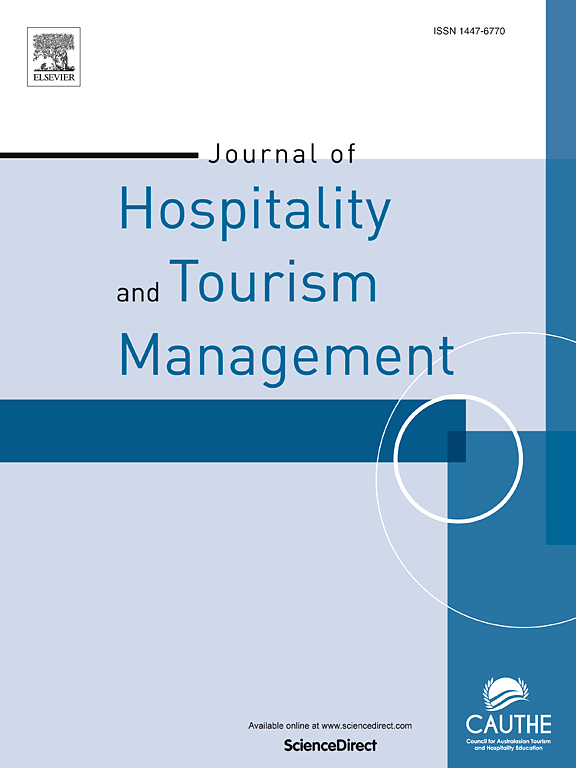The role of internet of things in shaping hotel booking intentions: A mixed-method investigation of customer perceptions and preferences
IF 7.8
1区 管理学
Q1 HOSPITALITY, LEISURE, SPORT & TOURISM
引用次数: 0
Abstract
Although the Internet of Things (IoT) has gained increasing attention in tourism and hospitality, research on customer preferences and behaviors on IoT's categorization is limited. To address this gap, this study examines hotel customers' perceptions and booking intentions regarding distinct types of IoT applications. It integrates intimacy theory and the technology acceptance model (TAM) to achieve an in-depth investigation, while also considering the important moderating effects of social phobia. Based on a sequential design, this study used a customized mixed-method approach involving video-elicitation focus group interviews with 28 interviewees and two scenario-based experiments with 920 participants. The analysis of interviews highlighted two nuanced forms of IoT-driven service encounters among various IoT applications, such as self-service and employee assistance. Accordingly, experimental studies were designed and further verified that employee assistance positively impacted customers' booking intentions. Moreover, psychological intimacy and perceived usefulness were identified as parallel mediators explaining the mechanism behind the main effect. The positive influence of employee assistance on booking intentions was negligible for customers with high social phobia. This research demonstrates an early attempt to explore how customers' classifications and preferences for various IoT application types influence their subsequent hotel booking intentions. The findings offer practical guidance for tourism and hospitality practitioners by underscoring the need for tailor-made operational strategies and marketing campaigns aimed at diverse IoT promotions.
物联网在塑造酒店预订意向中的作用:一项针对客户感知和偏好的混合方法调查
尽管物联网(IoT)在旅游和酒店业受到越来越多的关注,但对物联网分类的客户偏好和行为的研究却很有限。为了解决这一差距,本研究调查了酒店客户对不同类型物联网应用的看法和预订意图。它将亲密理论和技术接受模型(TAM)结合起来进行深入的研究,同时也考虑了社交恐惧症的重要调节作用。基于顺序设计,本研究采用定制的混合方法,包括28名受访者的视频启发焦点小组访谈和920名参与者的两个基于场景的实验。对访谈的分析强调了在各种物联网应用中,物联网驱动的服务遭遇的两种微妙形式,如自助服务和员工协助。因此,我们设计了实验研究,并进一步验证了员工协助对顾客预订意愿的正向影响。此外,心理亲密和感知有用性被认为是解释主效应背后机制的平行中介。对于高度社交恐惧症的顾客来说,员工协助对预订意愿的积极影响可以忽略不计。这项研究展示了一项早期尝试,旨在探索客户对各种物联网应用类型的分类和偏好如何影响他们随后的酒店预订意图。研究结果强调了针对不同物联网促销活动量身定制的运营策略和营销活动的必要性,为旅游业和酒店业从业人员提供了实用指导。
本文章由计算机程序翻译,如有差异,请以英文原文为准。
求助全文
约1分钟内获得全文
求助全文
来源期刊
CiteScore
13.30
自引率
8.40%
发文量
177
审稿时长
45 days
期刊介绍:
Journal Name: Journal of Hospitality and Tourism Management
Affiliation: Official journal of CAUTHE (Council for Australasian Tourism and Hospitality Education Inc.)
Scope:
Broad range of topics including:
Tourism and travel management
Leisure and recreation studies
Emerging field of event management
Content:
Contains both theoretical and applied research papers
Encourages submission of results of collaborative research between academia and industry.

 求助内容:
求助内容: 应助结果提醒方式:
应助结果提醒方式:


